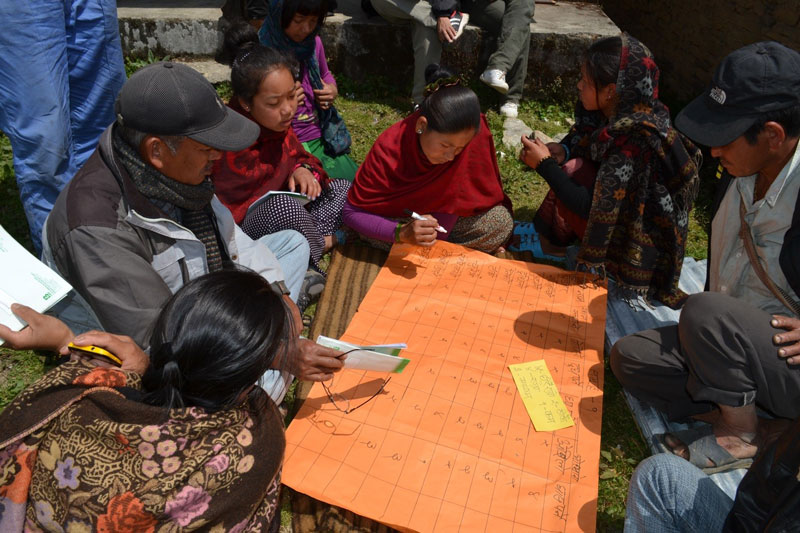*(Refers to countries that signed up to the 1992 United Nations Framework Convention on Climate Change.)
Climate-resilient pathways through grassroots innovation, engagement, and knowledge co-creation: Nepali farmers developing community-based adaptation plan to build resiliency in their crop-livestock systems.
For almost a generation, adaptation in response to a changing climate has been the neglected stepchild of climate policy. Even as adaptation has more recently gained mainstream acceptance as an unavoidable response to changing climate, it continues to be a sideshow to efforts to establish a binding limit on emissions through international agreement. But a focus on adaptation draws attention to opportunities for achieving desirable social outcomes like sustainable food and energy systems, and more equitable wealth distribution—outcomes that can both improve resilience in the face of climate change and reduce human contributions to warming. Pragmatically, effective response to climate change thus necessitates investment in innovation (both technological and institutional) aimed at human adaptations to changing contexts, needs, and socio-economic conditions. Highly ambitious development agendas, such as the sustainable development goals currently under consideration by the U.N., in turn become more feasible when it is framed within the context of adaptation as innovation. A properly framed vision of climate adaptation can thus create a multitude of political opportunities and policy pathways by shifting the focus away from prescriptive policy regimes that foster gridlock, toward the pursuit of enhanced human thriving and resilient socio-ecological systems that can sustain us in the future.
Related publications:
Adapting to Climate Change: Retrospective Analysis of Climate Technology Interaction in the Rice-Based Farming System of Nepal http://www.tandfonline.com/doi/abs/10.1080/00045608.2010.518035
Climate Pragmatism: Innovation, Resilience and No Regrets http://thebreakthrough.org/archive/climate_pragmatism_innovation
Institutional and technological innovation: Understanding agricultural adaptation to climate change in Nepal http://www.sciencedirect.com/science/article/pii/S0143622811001834?np=y
Adaptation as innovation, innovation as adaptation: An institutional approach to climate change http://www.sciencedirect.com/science/article/pii/S0143622811001883
Climate adaptation: Institutional response to environmental constraints, and the need for increased flexibility, participation, and integration of approaches http://www.sciencedirect.com/science/article/pii/S0143622812001713
Adaptive capacity in light of Hurricane Sandy: The need for policy engagement http://www.sciencedirect.com/science/article/pii/S0143622814000101
Turning conflict into collaboration in managing commons: A case of Rupa Lake Watershed, Nepal https://www.thecommonsjournal.org/articles/10.18352/ijc.561/
O’Neill, D., J. H. Takamura Jr., N. Chhetri, M. Henderson and B. Rogers. 2012. Frugal Innovation. Pp. 96-113 In: Colledge, T. H. ed., Convergence: Philosophies and Pedagogies for Developing the Next Generation of Humanitarian Engineers and Social Entrepreneurs. International Journal of Service Learning in Engineering: Humanitarian Engineering and Social Entrepreneurship. http://www.mse.mtu.edu/~pearce/papers/2012%20Convergence.pdf
Chhetri, N. B. and N. Chhetri. 2015. Alternative imaginations: Examining complementarities across knowledge systems. Pp. 11-24 In: Sumida Huaman, E. and B. Sriraman eds., Indigenous Innovation: Universalities and Peculiarities. Sense Publishers. http://link.springer.com/chapter/10.1007/978-94-6300-226-4_2
Lifting the taboo on adaptation http://archive.cspo.org/documents/NatureAdapt.pdf
Breaking the Global-Warming Gridlock http://www.theatlantic.com/magazine/archive/2000/07/breaking-the-global-warming-gridlock/304973/
